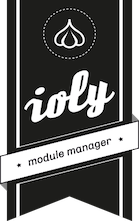ioly – the new open source module manager for any PHP project
The weather in Germany usually becomes rainy, grey and cheerless by the end of October / beginning of November, so no wonder some people move for a holiday trip southward if they can afford it. An interesting idea is to combine both, job and holiday and to stock up on some sunshine while working in the bright and sunny realms.
This is exactly what some of the developers – I count myself lucky to know – did: they organized a hut and the travels, found others with the same intention and hunkered down to do their daily job somewhere at the Spanish shores. Maybe others would have called it “Developers paradise” 😉
Interestingly, in their spare time, these guys were thinking about coding something innovative, something the world really seems to lack of, and they came up with ioly (ajar to Aioli as they apparently consumed loads of garlic and olive oil over there).
ioly is a module manager for any PHP project, independent from the usage of composer in your development workflow. ioly consists of a central “cookbook” where anyone, module/extension/plugin/package-writers as well as users can contribute their so called “recipes” on GitHub via pull-requests. These recipes can then be installed directly using the ioly terminal console, or by using an ioly connector designed for your system. The recipes can also be seen here, at the getioly site.
 With ioly, it doesn’t matter where an extension is hosted, which path to extract it to in an installation, nor which project it is for: you just declare these options in a simple json file.
With ioly, it doesn’t matter where an extension is hosted, which path to extract it to in an installation, nor which project it is for: you just declare these options in a simple json file.
But please note: ioly is not made for selling extensions, modules or plugins. As is, it can be used for automatic installation of extensions under a libre/free and open source license, freeware, public domain or even demo-software. If you have something different in mind, please feel free to extend it your way and don’t forget to send a pull request to the origin.
If you want to use ioly in your application or project, it might be necessary to write a connector for it as the ioly developers already gratefully did for OXID eShop.
Of course, you also can have your own repository for it, because ioly itself is open sourced under MIT license and thus can be used in any open source and commercial projects.
So; what are you waiting for!? Go and get your hands on the OXID Connector and get forking!

[…] lesenswerten Blogpost zu ioly gibt es auch vom OXID Community Manager Marco […]